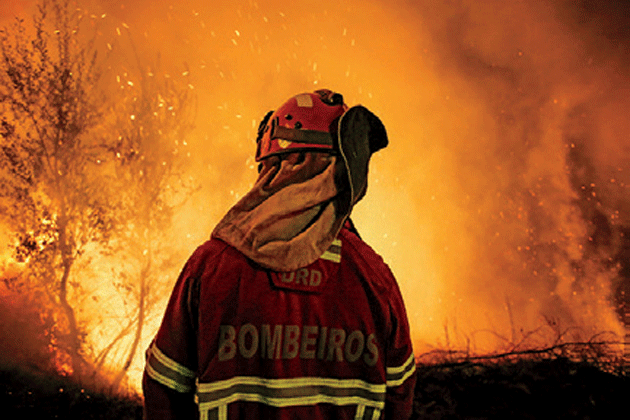Inside the August Issue
Richard Manning and Scott Sayare on mega-fires; Alexander Dziadosz on climate change in Iraq; Andrew Cockburn on nuclear war; John Ashbery’s last poem; and more

A firefighter in Portugal © Pedro Nunes/Reuters
Does it seem to you like the world is on fire? It’s not just your white-hot anxiety over the future of democracy and the state of the republic; the world literally is on fire. The August issue of Harper’s Magazine offers two examinations of the causes and the costs of recent wildfires at home and abroad, a package we call AS THE WORLD BURNS.
Richard Manning’s examination of the fires that raged across Montana last summer, “Combustion Engines,” blames global warming, a century of fire mismanagement, and the building of homes in fire-prone areas. Scott Sayare, in “There Will Always Be Fires,” describes the conditions in Portugal—notably the heavy planting of eucalyptus—that led to the catastrophic blazes there. Meanwhile, President Donald Trump’s budget has proposed cuts for the Regional Climate Centers, which provide data used to help control and prevent wildfires (these cuts were not made in the final appropriations). Until Europe, the United States, and the rest of the world come up with effective strategies for managing a fire-prone landscape, and until we deal more efficiently with climate change, greed, and improper home construction, there will only be more fires in the future.
For two millennia, the abundance of rivers and marshes in southern Iraq—considered by many to be the location of the biblical Garden of Eden—made flowing water easily accessible. Now Iraq faces perhaps the most dire environmental outlook on the planet, with heat extremes, dust storms, air pollution, and drought potentially leaving large swathes of the Middle East uninhabitable in the coming decades. In “The End of Eden,” Alexander Dziadosz views the situation through the eyes of the Mandaeans, an ancient gnostic sect whose adherents follow the teachings of John the Baptist and depend on water to practice their faith. In recent years, however, climate change, wasteful irrigation, and an escalating regional conflict over water access has steadily reduced the number of places where the Mandaeans can worship. Within a generation or two, Dziadosz writes, the land where civilization began may struggle to support human life.
“Climate Correction” is the title of John Ashbery’s last poem, handwritten at his home in Hudson, New York, on August 25, 2017. Ashbery died just a few days later, on September 3. “Walk in the reeds. Be / contumely about it,” he instructs. “In other words, persist.” We are so pleased to have these final lines from one of America’s greatest poets in our pages this month.
And now back to the bad news: the idea of Donald Trump as steward of the nuclear codes is enough to make one’s brain combust. In “How to Start a Nuclear War,” Andrew Cockburn reminds us how close the president is to the launch button. Indeed, as Harper’s Washington editor explains, the process by which the president might order a nuclear attack has actually been streamlined over the past several administrations. Cockburn surveys the American “nuclear machine” and finds a faulty system with few safeguards in place. And despite the efforts of a few members of Congress who have authored legislation to rein in presidential nuclear power, it doesn’t look as if the system is going to get any more secure in the near future.
In this month’s Easy Chair, Walter Kirn writes about a reversal he believes is happening between liberals and conservatives. Growing up Mormon in the Midwest of the Seventies, liberals were his heroes, they were the people who spoke the radical truths and marched to the beat of their own drum. Now, as Kirn sees it, the people who are letting it all hang out are the ones you might find at a Trump rally. Liberal principles have eroded, replaced by rigidity, stridency, shrillness, and self-righteousness.
“Mr. Hutchinson,” a story by Caleb Crain, follows Jacob Putnam—the protagonist of Crain’s first novel, Necessary Errors—as an imaginative misfit of a teenager, focusing particularly on the strange friendship that emerges between Jacob and his widowed older neighbor. Jacob’s diary entries frame the narrative, contrasting his bold, but naïve, interior life with the outward conservatism of his environment.
This month’s review section looks at Nick Drnaso’s hypnotically grim graphic novels and wonders why the criminal justice system is ill-equipped to prosecute rape charges.
And let’s end on happy note: among this month’s Findings we learn that the highly educated tend to underestimate how much time they have left to live. But then, after reading Harper’s August issue, maybe you just want to be done with it.



